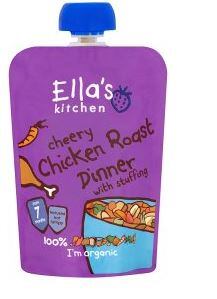Sales of both wet and dry baby food fell by 14% from 2012 to 2015, equating to a British tots tucking into 5 million kilograms less of processed baby food. Meanwhile demand for drinks aimed at babies fell by a massive 67% for the same period, albeit from a much smaller starting point of six million kilograms.
"This poses a threat to the baby food and drink market," says the market research company.
Price is a key driver in this fall in demand, with parents saying homemade food offers a cheaper way to feed their children. But 45% of the 800 parents surveyed said it also gives them control over ingredients.
“An on-going focus on sugar as a health foe means that, for many parents, control of baby’s diet is crucial," says Mintel. "[This] helps to explain why so many parents are choosing to feed their babies and toddlers homemade fare, and as a result, the popularity of homemade food poses a threat to the baby food and drink market.”
Premium flavours and online tutorials
Mintel analyst Amy Price told FoodNavigator a solution may lie in developing premium sub-brands. “Usage of manufactured food, drink and milk is higher than average among the most affluent parents [suggesting] opportunities to encourage trading up in the market through even more premium products," she said, citing the example of Aptamil’s Profutura range, which costs around 50p (€0.63) more per 100 g than the brand’s standard First Infant Milk range.
As well as going premium, manufacturers should also be looking at diversifying the flavours offered in their range, with nearly half (49%) of parents saying they liked their child to eat the same food as the rest of the family. “Baby and toddler food manufacturers should be exploring flavour trends seen in the overall food market, such as ethnic flavours, pulled pork etc to play on this mentality of eating foods similar to the rest of the family.”

Ella’s Kitchen, the leading baby food brand in the UK, has tapped into this trend with its Sunday roast dinner range, which includes ‘cheery chicken roast dinner with stuffing’ and ‘organic lovely lamb roast dinner with all the trimmings’ while global giant Heinz offers parents a seasonal Christmas dinner range.
Brands and private labels could also “play a role in their own self-sufficiency” by sharing expertise with parents through online tutorials, for instance. “This can position them as empowering parents but also offers a means for them to show how they can help offload some of this burden," says Mintel.
Trust in the brand was the top reason cited for choosing a particular baby milk, formula or food – but this was the case for only 36% of parents meaning that for around two thirds, brand name does not impact their choice.
This was closely followed by a no added sugar claim, with 32% of parents saying this influenced their choice.
One quarter of respondents said they did not buy baby or toddler food.
Gluten-free boom
Despite these figures, a small segment within the baby food category that is experiencing its own boom is gluten-free. According to 2014 Euromonitor data, baby food had a 14% share of the global gluten-free market and was particularly important in Russia, Spain and Italy.
Meanwhile, Mintel’s global new product database shows that 42% of all new baby food products were labelled as gluten-free in 2014.
